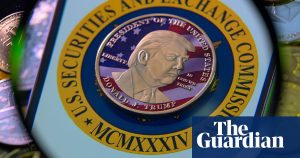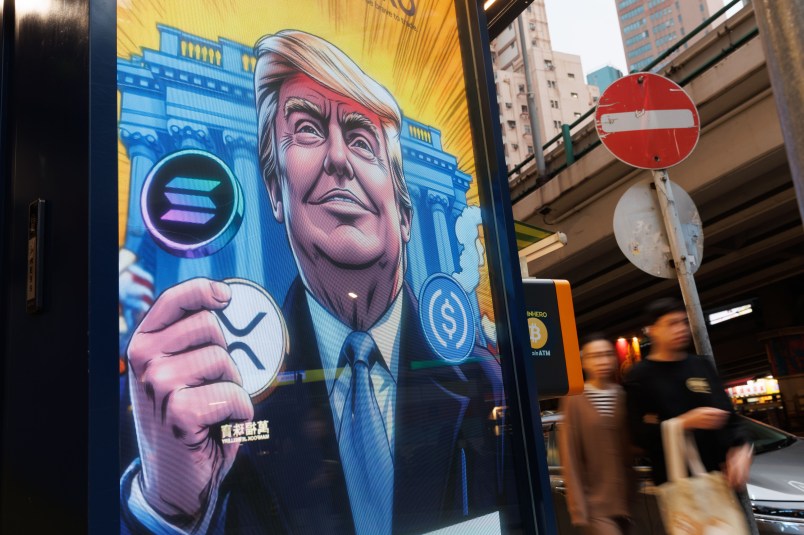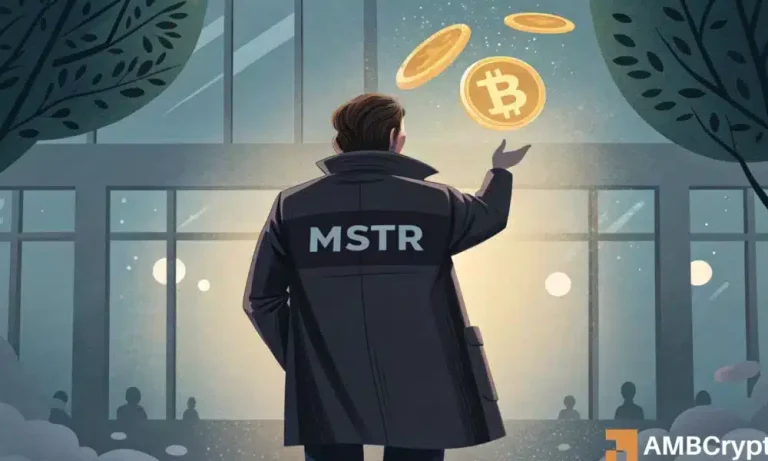A $2 billion Trump-branded crypto deal. Access to the President auctioned off to top holders of $TRUMP coin. Businesses bragging about spending $20 million on the President’s branded crypto coin in a bid to gain influence.
President Trump’s crypto ventures are, on their face, a mess of corruption that looms over 2025’s politics. In its shadow last week, the Senate came very close to passing the first significant piece of legislation aimed at legitimizing critical elements of the crypto industry.
That effort failed, for now. But whether it is dead, or merely deferred, remains a topic of some dispute. Negotiations continue. The bipartisan bill was long-sought by the fledgling cryptocurrency industry, which flexed its financial muscles in the 2024 elections, and which has signaled it will continue to do so.
The bill would regulate stablecoins, a form of cryptocurrency pegged to the U.S. dollar. They’re typically used as a stable means to buy other, more volatile crypto coins. The coins are popular. Trump himself has offered one through his World Liberty Financial crypto venture.
The legislation has opened up a group of Democrats — who initially planned to support the bill — to criticism that they are legitimizing a particularly brazen example of Trumpian corruption and, from crypto skeptics, that they’re helping legitimize an industry that exists largely for speculation and untraceable money transfers. Supporters of the bill contend this is the best shot available to bring a degree of regulation to this aspect of crypto.
Here are five points on the stablecoin showdown.
Extremely stable GENIUS Act
In the world of crypto, where coin prices can rocket up by orders of magnitude and collapse in the space of days or even hours, stablecoins are meant to solve a problem: with a peg to the dollar, they provide users with a stable price that everyone agrees on.
Critics of the industry say that stablecoins have operated in the same wild west-like atmosphere as the rest of the crypto world. Questions persist over whether stablecoin issuers have the backing assets to keep prices stable in the event that large numbers of people try to convert their holdings into dollars at once.
Crypto boosters say that these and many other issues can be solved through regulations that further enmesh digital currencies with the rest of the financial ecosystem. That’s part of why they like the GENIUS Act: if it became law, it would set standards for backing assets and subject stablecoin issuers of $10 billion and below to state oversight.
At the same time, the kinds of entities that could issue stablecoins would be broad: non-bank companies like Facebook or Tesla could issue the coins. Issuers would be able to obtain access to the federal reserve’s payment system. The CFPB would not have oversight authority over the issuers, though other regulators would.
It’s unclear what this regulation would mean, however, in a world where DOGE guts basic agency functions. Critics also contend that the bill has a loophole that would open the door to coins based on unregulated foreign assets.
“We don’t know what this OCC is going to do or FDIC is going to do in terms of actually regulating crypto stable insurers from a safety and soundness perspective,” Mark Hays, Associate Director for Cryptocurrency and Financial Technology at Americans for Financial Reform, told TPM.
For critics, the bill presents two interlocking but distinct questions: does it do enough to regulate stablecoins? And, should the government even be lending these instruments any legitimacy in the first place?
Why now?
The past several years have seen the crypto industry rise as a political force.
Democrats on Capitol Hill point to the Ohio Senate race last year as an example of this pivot in the industry’s political influence. That contest pitted Sherrod Brown, the long-serving Democratic incumbent and vociferous crypto skeptic, against Sen. Bernie Moreno, a luxury car dealer and longtime crypto devotee who once launched an effort to make Cleveland a blockchain hub (he dubbed it “Blockland”), and who helped launch a company that uses blockchain to record vehicle titles.
Defend American Jobs, a crypto industry super PAC, spent $40 million in the 2024 cycle attacking Brown, a longtime economic populist, while giving Moreno name recognition. It was a positive cycle for Republicans across the country, and Brown was serving in a state that has trended deeply red over the past decade, so Moreno’s win was not necessarily a huge surprise. But the crypto industry pocketed it, and began to broadcast to Democrats, many of whom it also supported, that it intends to use its newfound clout to push for new legislation.
Sen. Kirsten Gillibrand (D-NY) co-sponsored the GENIUS Act, and has become one of the industry’s biggest boosters within the Democratic Party. She denied to the New York Times that campaign contributions might have anything to do with policy.
“If you made your decisions on what you’re for based on who’s giving you the most money, you would fail as a member of Congress,” she said.
Trump corruption
Into all of this jumps President Trump and his family.
Even by their standards, the past few months have seen a whopping number of instances of alleged crypto-related self-dealing.
Take World Liberty Financial, a crypto firm largely owned by a Trump family corporate entity. The firm has already reportedly benefitted from White House announcements, including the commitment to create a federal crypto reserve. (World Liberty reportedly invested in a currency set to be included in the stockpile.) Donald Trump Jr. is heavily involved in the firm; Zach Witkoff, son of Trump foreign policy envoy and career friend Steve Witkoff, is a partner. Steve Witkoff is listed as a founder on an investor pitch.
The company issues a stablecoin called USD1; foreign entities, including an Abu Dhabi investment firm, have already expressed interest.
It’s a level of brazenness for which there’s little comparison in recent American politics. It’s prompted some Democrats to ask whether Congress is poised to approve a bill that, critics say, constitutes both a crypto industry wishlist and a legitimization of the means through which the President is pushing the frontiers of corruption.
Trump Speedbump
The GENIUS Act cleared the Senate Banking Committee in March with bipartisan support.
With Trump loudly hawking his crypto investments, however, the bill hit a snag last week. Nine Democrats, who had previously supported the bill, issued a statement demanding changes before continuing. Those include calls for stronger anti-money laundering provisions, among other proposals. A procedural vote to speed up consideration of the bill then failed.
It caused some to think that the pressure generated by Trump’s corrupt entanglements within the industry might be enough to stop the bill from passing. Others weren’t so sure.
Poised to pass?
Many observers TPM spoke with regard the situation with what some might describe as weary cynicism. Recognizing the political problems around passing this bill in the middle of a crypto-related corruption spree in the White House, Democrats decided it might be best to slow the process down.
They’ll take a few fig leaf amendments, this telling goes, claiming to have pocketed real concessions while voting for a bill that’s substantially the same.
Alternatively, per other reports, the bill could really be dead — at least for now. Another bill on crypto “market structure” may take the lead. Senate Majority Leader John Thune (R-SD) reserved the right last week to reintroduce the bill. Sen. Ruben Gallego (D-AZ), a Democratic ally of crypto, hinted to reporters that the process has not yet ended and dismissed the Trump crypto corruption allegations as a “distraction.”
“If we don’t pass any stablecoin legislation, he’s still going to do everything he’s going to do right now. The most important thing we can do is get a strong, strong bill,” he said.
Source link









